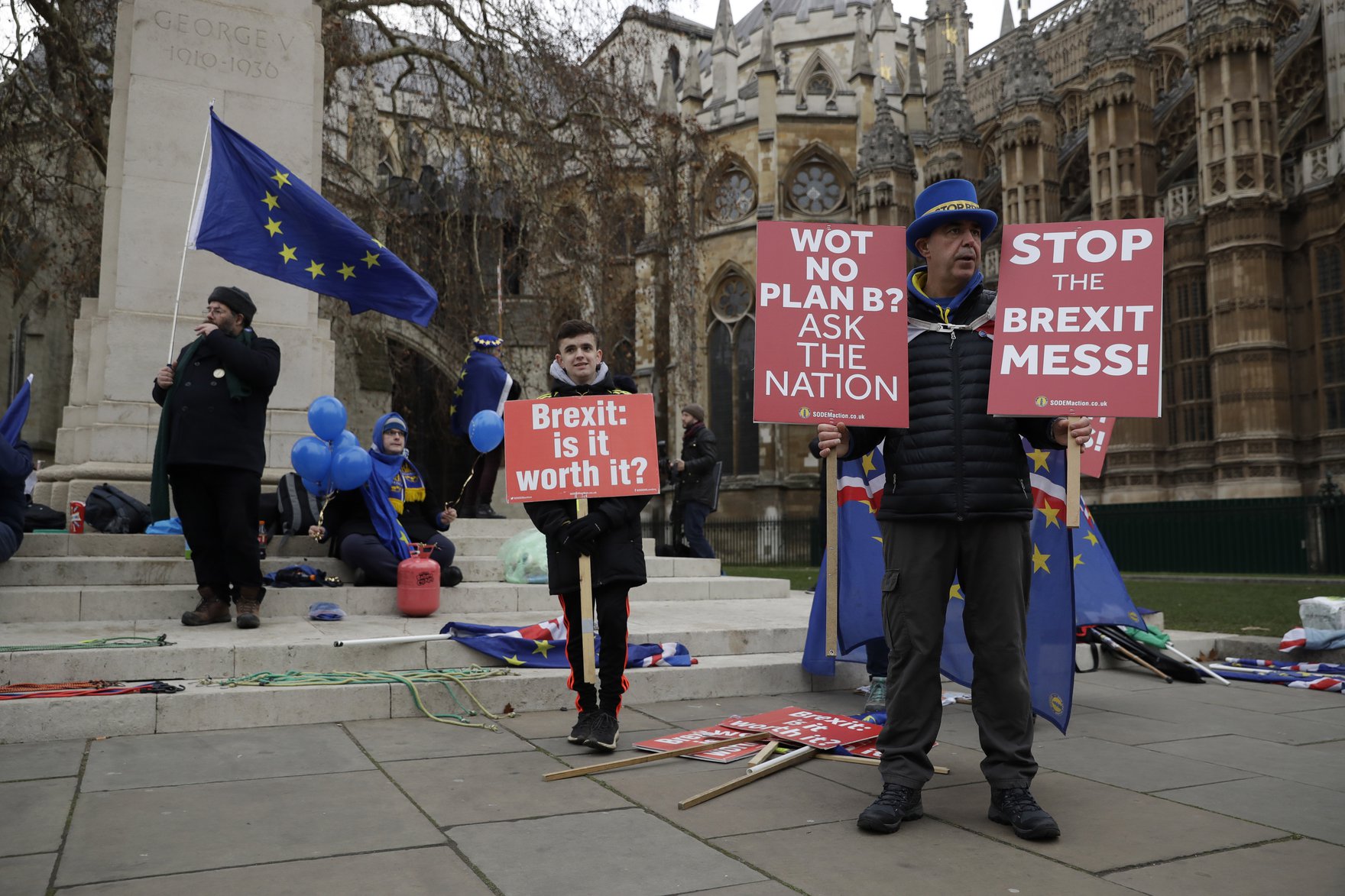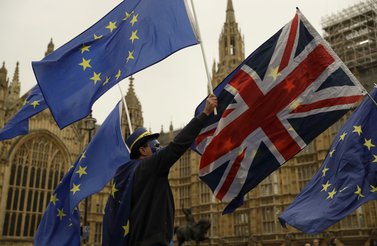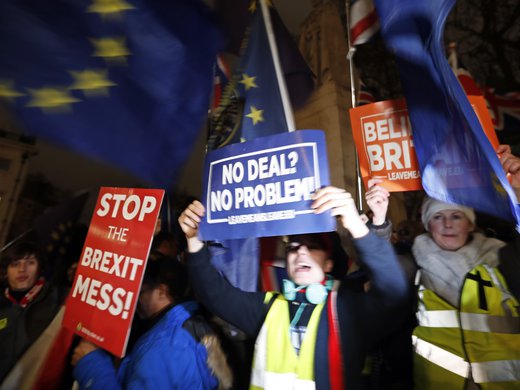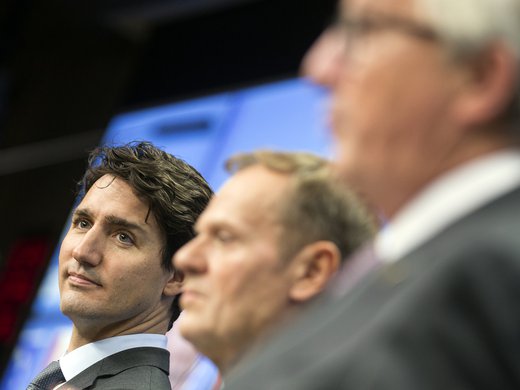On January 15, 2019, UK Prime Minister Theresa May, having negotiated a withdrawal agreement with the European Union — which would recognize the departure of the United Kingdom from the European Union but also give both parties a 19-month period to reach agreement on a long-term economic relationship — then failed to obtain a majority for the deal in Parliament. By a 432–202 vote, the withdrawal agreement was rejected in one of the most resounding defeats of a UK government in years. The Opposition leader, Jeremy Corbyn, immediately tabled a motion of no confidence, which May narrowly survived as supporters of the Tory government circled the wagons and voted in defence of their government.
A week later, only two things seem certain: the United Kingdom could leave the European Union without a deal on March 29, 2019, and its departure will have significant impact around the world — including in Canada.
A “Plan B” Brexit
Speaking after the no-confidence vote, May committed to cross-party consultation and to reporting back to Parliament on January 21 with a Plan B. In that promised statement to Parliament on Monday, May sought to gain time. She indicated that she would be continuing consultations in Parliament and the country at large to seek to find a consensus on an agreement with the European Union. Again, she ruled out seeking to extend the March 29 deadline, and rejected a second referendum. She also argued that the only way to avoid a no-deal outcome is to reach a deal — implying that something along the lines of her deal would be the only one possible.
The moment of truth for her position will come on Tuesday, January 29, when parliamentarians on both sides of the House of Commons will seek to move motions calling, variously, for indicative votes on different alternatives; the prohibition of a no-deal outcome; the extension of the March 29 article 50 deadline; and a peoples’ vote. Until this moment arrives, Brexit is at an impasse.
The United Kingdom, Divided
Opinions as to what should happen next are too numerous to count. According to a poll reported in The Guardian, 62 percent of Conservative Party voters are willing to support a no-deal departure. However, the majority of Labour supporters and members of Parliament (MPs) speaking in the Brexit debate, as well as of the general electorate and a wide range of social, industrial and professional groups, reject this outcome. They fear it will have a very negative impact on the British economy, institutions and society. The poll suggests that support among the general population for remaining in the European Union is now at 46 percent; 39 percent support leaving. It is widely reported that a large majority of MPs support remaining in the European Union if no deal can be reached, and a large majority in the House of Lords has always favoured this option. It is also reported that a considerable number of MPs would favour an arrangement with the European Union modelled on the European Economic Area agreement — known as the “Norway option”— under which the United Kingdom would commit to respecting the rules governing the EU internal market, including free movement of people, but not to a full customs union for goods. MPs from both sides of the House have been discussing the possibility of organizing a referendum on remaining in the European Union to head off a no-deal departure. The official position of the Labour Party is to respect the 2016 referendum result but to seek a general election and reach a deal based on remaining in the EU internal market and customs union. Many Labour MPs and a large majority of Labour voters favour remaining in the European Union, if there is no agreement on departure. Labour leader Corbyn has refused to participate in cross-party negotiations unless the no-deal option is taken off the table by the government.
Legislative Hurdles
Regardless of the path chosen, there are huge obstacles in the way of reaching any decision. May’s withdrawal agreement foundered on the commitment to maintain a customs union as part of the “Irish backstop,” a provision designed to keep the Irish border open until a long-term arrangement is in place. Until now, the government appears to have had only one plan; Plan B looks very much like Plan A.
No clear majority in Parliament for any other approach has emerged and, even if one had, procedural and political conditions make the formulation and approval of a new approach extremely difficult. The government, not Parliament, not only manages foreign and trade policy but also controls the business of the House of Commons. For Parliament to take over these functions would require a constitutional revolution. Who would lead this revolution? The normal solution of deposing the prime minister and seeking a new leader appears to have failed, as Conservative and Unionist MPs, who still command a majority, rejected it. The opposition Labour Party is, therefore, unable to provoke an election, which is not scheduled for a couple of years by the fixed-term elections legislation.
As mentioned, there is much talk of a referendum to stop a no-deal Brexit or to call for remaining in the European Union. A referendum, however, normally takes six months to organize. It could be done faster, but without agreement on the question (or questions) to be included, that seems unlikely. Furthermore, by the Withdrawal Act adopted in the summer of 2018, the United Kingdom will leave the European Union on March 29, 2019, unless this act is repealed or suspended. In short, the legislative hurdles to be jumped in order to avoid a no-deal Brexit may already be insuperable — March 29 is not far off.
Brexit’s Impact on Canada
Unfortunately, those beyond Britain’s borders will feel the impact of Brexit on March 29 as well. In GDP terms, Britain is the fifth-largest single national economy in the world. Canada’s economy is the tenth largest. The United Kingdom is the second-most important European country exporting goods and services to Canada, and the most important source of European foreign direct investment. In Europe, the United Kingdom is the most important export destination for Canadian goods and services and the most important destination of Canadian foreign direct investments. In short: Canada needs to maintain its trading relationship with the United Kingdom. This will require more than simply resolving any issues under World Trade Organization law — UK commitments on goods, including agricultural tariffs and services, have not been finally settled. The relationship already established under the recently adopted Comprehensive Economic and Trade Agreement (CETA) must also be maintained. By leaving the European Union, the United Kingdom would lose its CETA benefits, unless Canada proceeds with Prime Minister Justin Trudeau’s declared intention to maintain a “seamless transition” from the European Union to a Canada-UK trade agreement. To achieve this, an international agreement backed up by legislative measures is required. Given the limited time available and the uncertainty around the United Kingdom’s status after March 29, a seamless transition will be no small feat. Surely, Canadian officials have been working hard with respect to the general conditions of bilateral trade, as well as on special issues such as air transport services and trade in nuclear materials. But time is now desperately short, and much remains to be done.
Brexit negotiations have been nothing short of chaotic since a referendum was proposed. The proceedings have created incredible economic and political uncertainty for Britain, the European Union and the rest of the world. In Canada, Brexit could open the door to more than the economic troubles discussed above; if the United Kingdom, the country on which Canada’s constitution and parliamentary system is largely based, cannot manage its political system, what does this imply for Canadian parliamentary democracy?





